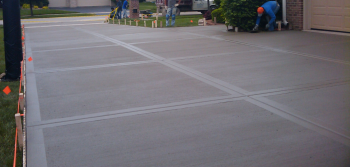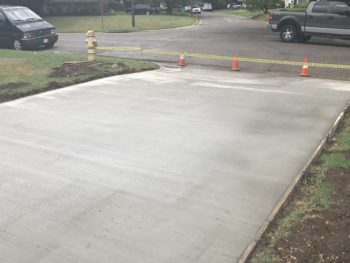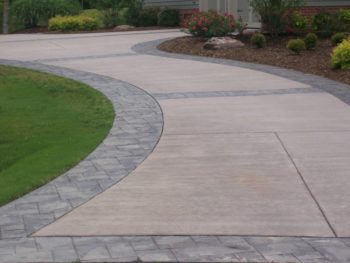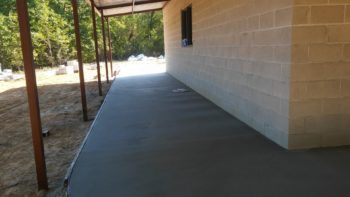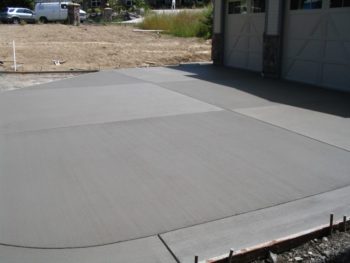When To Replace Your Concrete Driveway – A Complete Guide For The Houston Area.
When It’s Time for a New Concrete Driveway in Houston
Your driveway is more than just a path to your garage—it’s your home’s first impression and a crucial part of your property’s curb appeal. In Houston’s unique climate, concrete driveways face special challenges that can accelerate wear and tear. Knowing when to repair versus replace can save you thousands of dollars and prevent costly damage to your home’s foundation.
This guide will help you identify the warning signs that your Houston driveway needs replacement, understand how the local climate affects concrete, and find the right contractor for the job.
Understanding Houston’s Impact on Concrete Driveways
Houston’s subtropical climate creates a perfect storm for concrete deterioration. The combination of extreme heat, high humidity, and unpredictable weather patterns puts unique stress on concrete surfaces.
Temperature Extremes and Thermal Cycling
Summer temperatures in Houston regularly exceed 95°F, with pavement temperatures reaching 140°F or higher. These extreme temperatures cause concrete to expand significantly. When cooler weather arrives, the concrete contracts rapidly. This constant expansion and contraction, called thermal cycling, creates microscopic cracks that grow over time.
The thermal stress is particularly damaging because Houston experiences such dramatic temperature swings. A winter day might start at 35°F and reach 75°F by afternoon, forcing your driveway through multiple expansion-contraction cycles in a single day.
Humidity and Moisture Challenges
Houston’s average humidity hovers around 75%, creating constant moisture exposure for concrete surfaces. High humidity slows the evaporation of water from concrete pores, keeping the material in a perpetually damp state. This moisture accelerates chemical reactions that break down the concrete matrix over time.
The combination of heat and humidity also promotes the growth of algae, mold, and mildew on concrete surfaces, creating unsightly stains and potentially weakening the surface layer.
Severe Weather Events
Houston faces unique weather challenges that put additional stress on concrete driveways:
- Heavy rainfall: The city receives over 49 inches of rain annually, often in intense downpours that test drainage systems
- Tropical storms and hurricanes: These events bring flooding, debris, and extreme wind that can damage concrete surfaces
- Hail storms: Large hail can chip, crack, and pit concrete surfaces
- Freeze-thaw cycles: While infrequent, Houston’s occasional freezes can cause significant damage when water in concrete cracks freezes and expands
Warning Signs Your Driveway Needs Replacement
Surface Cracks: More Than Cosmetic Concerns
Not all cracks are created equal. Understanding the difference between minor settling cracks and serious structural issues helps you make informed decisions.
Hairline cracks less than 1/8 inch wide are often cosmetic and can be repaired with crack filler or sealant. These typically result from normal concrete shrinkage during curing.
Structural cracks wider than 1/4 inch indicate more serious problems. These cracks often result from:
- Poor initial installation with inadequate base preparation
- Soil movement from Houston’s expansive clay soils
- Tree root intrusion
- Heavy vehicle loads exceeding the driveway’s design capacity
Pattern cracking or “map cracking” across large areas signals concrete deterioration from age, freeze-thaw damage, or chemical breakdown. This type of cracking typically cannot be effectively repaired.
Potholes and Surface Deterioration
Potholes form when water penetrates cracks and erodes the underlying base material. In Houston’s climate, the combination of heavy rains and heat accelerates this process. Small potholes quickly become larger ones, especially under the weight of vehicles.
Surface scaling, where the top layer of concrete flakes away, often results from:
- Poor concrete mix design
- Rapid temperature changes
- De-icing salt damage (less common in Houston but can occur)
- Age-related deterioration
Drainage Problems and Standing Water
Proper drainage is critical in Houston’s high-rainfall environment. Signs of drainage issues include:
- Standing water that remains on the driveway 24 hours after rain
- Water pooling against your home’s foundation
- Erosion patterns around driveway edges
- Vegetation growth in cracks or along edges
Poor drainage not only damages the concrete but can also cause foundation problems, basement flooding, and landscape erosion.
Settling and Uneven Surfaces
Houston sits on expansive clay soils that shrink and swell dramatically with moisture changes. This soil movement can cause concrete slabs to settle unevenly, creating:
- Trip hazards where sections have moved out of alignment
- Vehicle damage risks from scraping on uneven transitions
- Accelerated wear on tires and vehicle suspension
- Water collection in low spots
Significant settling usually indicates inadequate base preparation or major soil movement that cannot be corrected with simple repairs.
Age-Related Deterioration
Concrete driveways typically last 20-30 years with proper maintenance. However, Houston’s harsh climate can reduce this lifespan to 15-25 years. Signs of age-related deterioration include:
- Color fading and surface chalking
- Increased porosity that allows water penetration
- Loss of surface texture making the driveway slippery when wet
- Multiple previous repairs that no longer hold effectively
Assessing Your Driveway’s Condition
DIY Inspection Checklist
You can perform a basic driveway assessment using these simple techniques:
Visual inspection: Walk your entire driveway slowly, noting:
- Crack locations, widths, and patterns
- Areas of standing water after rain
- Staining or discoloration
- Surface texture changes
Water test: Pour water on different areas of your driveway. Water that quickly disappears into cracks indicates structural issues requiring attention.
Stability check: Press firmly on areas near cracks. Concrete that moves or feels spongy likely has base problems.
Drainage observation: During the next heavy rain, observe how water flows across your driveway. Note areas where water pools or drains toward your foundation.
When to Call a Professional
Some situations require professional assessment:
- Cracks wider than 1/4 inch or those that continue to grow
- Any settling or height differences between concrete sections
- Drainage issues affecting your home’s foundation
- Multiple repair attempts that have failed
- Safety concerns like significant trip hazards
The Hidden Costs of Delaying Replacement
Foundation Damage
Poor driveway drainage can direct water toward your home’s foundation, leading to:
- Basement flooding requiring expensive waterproofing
- Foundation settling that causes structural damage
- Soil erosion undermining foundation stability
Foundation repairs typically cost $10,000-$40,000, making driveway replacement a wise preventive investment.
Vehicle Damage
Rough, uneven driveways can damage vehicles through:
- Tire wear from scraping on rough surfaces
- Suspension damage from impacts with uneven sections
- Oil pan damage from scraping on raised areas
- Alignment problems from navigating around obstacles
Property Value Impact
Real estate professionals estimate that a deteriorated driveway can reduce property values by 5-10%. In Houston’s competitive housing market, curb appeal significantly impacts buyer interest and final sale prices.
Choosing the Right Houston Contractor
Essential Qualifications to Verify
When selecting a concrete contractor in Houston, verify these qualifications:
Licensing and insurance: Texas requires contractors to be licensed for projects over $20,000. Always verify current licenses through the Texas Department of Licensing and Regulation. Ensure the contractor carries both liability insurance and workers’ compensation coverage.
Local experience: Choose contractors with at least five years of experience in the Houston area. Local experience means understanding Houston’s soil conditions, climate challenges, and permit requirements.
Better Business Bureau rating: Check BBB ratings and complaint history. Look for contractors with A+ ratings and positive resolution of any complaints.
Questions to Ask Potential Contractors
About their process:
- How do you prepare the base for Houston’s expansive clay soils?
- What concrete mix design do you use for Houston’s climate?
- How do you ensure proper drainage?
- What expansion joints will you include?
About their work:
- Can you provide references from recent Houston projects?
- What warranty do you offer on materials and workmanship?
- How do you handle change orders and additional costs?
- What is your timeline for completion?
About their business:
- How long have you been operating in Houston?
- Are you licensed and insured in Texas?
- Who will supervise the work on-site?
- How do you handle weather delays?
Red Flags to Avoid
Be cautious of contractors who:
- Solicit door-to-door or use high-pressure sales tactics
- Demand full payment upfront before starting work
- Cannot provide local references or proof of licensing
- Offer prices significantly below other competitive bids
- Rush the timeline without considering Houston’s weather patterns
- Cannot explain their process for dealing with Houston’s soil conditions
Getting Accurate Estimates
Request detailed written estimates that include:
- Excavation depth and base preparation specifications
- Concrete specifications including PSI strength and mix design
- Reinforcement details such as rebar or wire mesh
- Drainage solutions and any required grading
- Timeline including weather contingencies
- Cleanup and disposal of old concrete
- Warranty terms for both materials and workmanship
Expect estimates to vary by 10-15% between qualified contractors. Extremely low bids often indicate corners will be cut on materials, base preparation, or proper techniques.
Making the Investment Decision
Cost Considerations
New concrete driveway installation in Houston typically costs $4-$8 per square foot for basic concrete, with decorative options ranging from $8-$15 per square foot. Factors affecting cost include:
- Driveway size and shape
- Excavation requirements
- Base preparation needs
- Decorative finishes or coloring
- Drainage improvements
- Access challenges
While the initial investment may seem significant, consider the long-term value of proper installation designed for Houston’s challenging environment.
Timing Your Project
The best time for driveway replacement in Houston is during the drier months from October through April. This timing offers:
- More predictable weather with fewer rain delays
- Better concrete curing conditions with moderate temperatures
- Contractor availability during their less busy season
- Potential cost savings due to lower demand
Avoid scheduling concrete work during Houston’s hurricane season (June through November) when possible.
Conclusion: Protecting Your Investment
Your driveway represents a significant investment in your property’s functionality, safety, and value. In Houston’s challenging climate, recognizing the signs that replacement is needed—rather than continuing to patch and repair—ultimately saves money and prevents more serious problems.
Don’t wait until small issues become major headaches. If your driveway shows multiple warning signs like extensive cracking, drainage problems, or significant settling, start researching qualified contractors now. The investment in a properly installed concrete driveway designed for Houston’s unique conditions will serve you well for decades to come.
Remember that the cheapest option is rarely the best value. Choose contractors with proven Houston experience, proper licensing, and solid reputations. Your new driveway should not only solve current problems but also withstand the challenges that Houston’s climate will bring in the years ahead.
Take action today by conducting a thorough inspection of your current driveway and consulting with qualified professionals if you notice any of the warning signs discussed in this guide. Your home, your vehicles, and your wallet will thank you for making this important investment at the right time.
